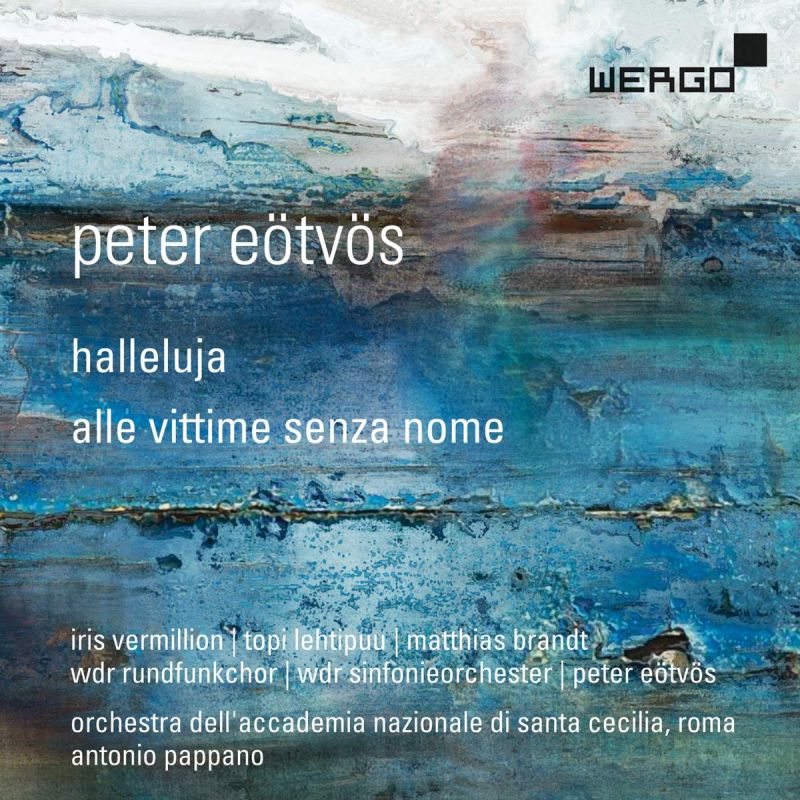EÖTVÖS Halleluja - oratorium balbulum; Alle vittime senza nome
View record and artist detailsRecord and Artist Details
Composer or Director: Matthias Brandt, Peter Eötvös
Genre:
Vocal
Label: Wergo
Magazine Review Date: 01/2020
Media Format: CD or Download
Media Runtime: 74
Mastering:
DDD
Catalogue Number: WER73862

Tracks:
| Composition | Artist Credit |
|---|---|
| Halleluja - Oratorium Balbulum |
Peter Eötvös, Composer
Iris Vermillion, Mezzo soprano Matthias Brandt, Composer Peter Eötvös, Composer Topi Lehtipuu, Tenor WDR Choir WDR Symphony Orchestra |
| Alle vittime senza nome |
Peter Eötvös, Composer
Antonio Pappano, Conductor Peter Eötvös, Composer Santa Cecilia Academy Orchestra, Rome |
Author: Guy Rickards
Peter Eötvös’s Halleluja (2015) is styled ‘oratorium balbulum’ – a stammering oratorio – and subtitled ‘Four Fragments’. The latter does not indicate sections of a larger work, but rather that the whole is not a conventional choral-and orchestral work with a linear narrative. This is apparent from the outset, with the choir’s opening, unresolved question ‘Who are we?’ and the at times sideways pronouncements of the narrator, deliciously delivered by Matthias Brandt, who makes it very clear that he is the narrator.
Halleluja – oratorium balbulum is, then, at least partially a composition about itself, about the relationship of words and music, and to silence. The ‘choir represents a society that says “hallelujah” to everything’, Eötvös has stated, while the stammering of them and the soloists derives from the late 9th/early 10th-century Benedictine monk Notker the Stammerer (aka Notker Balbulus), whose liturgical sequences made him an important figure in musical development. It is impossible to say more as, maddeningly, Wergo does not provide the libretto written jointly by Eötvös and the late Péter Esterházy.
Nonetheless, it is not difficult to appreciate the quality of the musical setting, nor the splendid live performance captured in Cologne in 2017. The performers sound at one in their presentation, whether in the hushed choral comments or the chiming percussion that dominates some sections. The whole is more than the sum of its fragments, compelling and involving, as is the purely orchestral companion, Alla vittime senza nome (‘To the nameless victims’, 2016), a three-movement threnody to the countless masses of African and Middle Eastern people dying in waves seeking refuge in Europe. Whether due to the urgency of Eötvös’s expressive intent, his attaining ever greater compositional refinement or the more approachable idiom, Alla vittime is the most affecting and impressive work of his that I have heard. It is brilliantly rendered here by Pappano and the Santa Cecilia Orchestra. Very strongly recommended.
Discover the world's largest classical music catalogue with Presto Music.

Gramophone Digital Club
- Digital Edition
- Digital Archive
- Reviews Database
- Full website access
From £8.75 / month
Subscribe
Gramophone Full Club
- Print Edition
- Digital Edition
- Digital Archive
- Reviews Database
- Full website access
From £11.00 / month
Subscribe
If you are a library, university or other organisation that would be interested in an institutional subscription to Gramophone please click here for further information.




